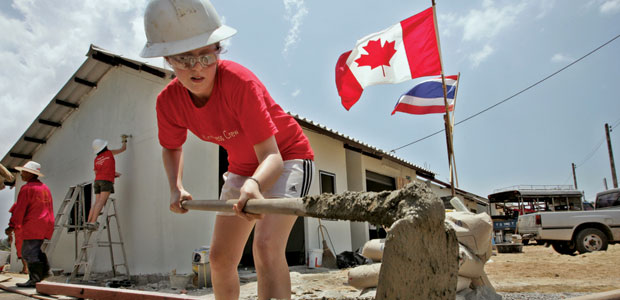Advertisement
Unsung Heroes
Volunteers tell their stories

Every year, millions of Canadians volunteer their time and energy to worthy causes at home and abroad. Some do it to contribute to their community, others for personal growth. I talked to four extraordinary volunteers about their experiences and found out why helping others is so rewarding.
Acting on Inspiration
The motivation to volunteer is different for everyone. After Princess Diana died, Heather Lombard read an article in her local newspaper about a crisis-line training program. Inspired by Princess Di’s work with AIDS patients and on the landmine issue, she decided it was time she made a difference, too. Lombard fielded crisis-line calls for the subsequent six years.
“I felt connected to the people in my community who needed an empathetic ear,” says Lombard. “It was the best feeling in the world when I was able to get help for a suicidal caller or give hope to someone who was feeling down.”
Lombard also felt a sense of closeness and camaraderie with the other volunteers–it was like being part of a family. “I had a greater sense of the common ground we all share as human beings,” she said.
Discovering Hidden Talents
Sometimes volunteering can create new life paths. Victoria Stratton has been volunteering at the Lower Mainland Down Syndrome Society for almost seven years. Stratton joined because her daughter has Down syndrome and she hoped she’d find families and friends to connect with. She found a lot more. As a volunteer she’s organized fundraisers and social events, promoted public awareness, and produced the society’s newsletter.
“It was great to find out that I could help other families–passing on resources, telling good news stories, announcing special events, and so on,” says Stratton. While producing the newsletter, Stratton found she had a talent for writing.
“Volunteering often helps launch people into careers; they help out somewhere that interests them and suddenly they have experience and some confidence, as well as a good feeling about doing something for others,” she says.
Finding a Niche
It can take a while to figure out how one’s talents can be useful. Anna Camporese never thought her passion for quilting could ever help anyone. Then she volunteered for Monarch Place, a safe house for women and children fleeing domestic violence and abuse. Every month she met with a group of women to sew quilts for the house’s residents.
Camporese explains, “Since the women and children at the shelter have nothing, they are very happy to receive something handmade. For some this was the first time in their lives that they had been given something made just for them.”
Though she never met the abused women and children personally (the location of the shelter was carefully guarded), Camporese made the best quilt she could, knowing that the recipient would cherish it. She also got to work with a group of smart, intelligent, funny women who were all united in reaching out to those in need.
Building a Community
Volunteering also unites us across cultures. Angela Westgeest volunteers with Project Brotherhood, an organization that helps the poorest in Canada and abroad. Her desire to learn a new language took her to Mexico, where she helped build houses for needy families.
“I had never had such an immense sense of being so truly appreciated. The families we helped literally went without to give us small gifts.”
Westgeest recalls how one Mexican woman rescued her family’s dinner–a thin scrap of meat–after the meat was accidentally knocked into the dirt. “I could sense her humiliation as she scrambled to pick up the meat and dust it off for that night’s dinner.”
Westgeest will never forget her experience. “I was struck by the resilience of the people–and the contagious laughter. A part of Mexico will always live in my heart.”




